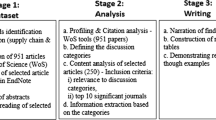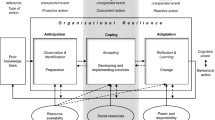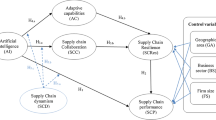Abstract
With the increasing frequency and impact of supply chain disruptions, firms face significant challenges in achieving supply chain resilience (SCR). Although SCR is crucial in responding to market variability and unexpected events, it is unclear how to strengthen it and its boundary conditions. Drawing upon paradox theory, this study investigates how paradox cognition enhances SCR via organizational unlearning, and the moderating role of market environment. We employ hierarchical regression analysis and bootstrapping method to examine hypothesized relationships by collecting multi-response data from 277 manufacturers in China. The findings suggest that paradox cognition enhances organizational unlearning, which further promotes proactive and reactive dimension of SCR. Organizational unlearning mediates the impacts of paradox cognition on proactive and reactive dimension of SCR. Furthermore, market turbulence strengthens the influence of paradox cognition on organizational unlearning, while the moderating influence of competitive intensity is insignificant. This research helps us comprehensive understand the theoretical framework of paradox cognition and SCR, and provides insights into how firms can benefit from different dimensions of SCR.


Similar content being viewed by others
References
Ali I, Sadiddin A, Cattaneo A (2023) Risk and resilience in agri-food supply chain SMEs in the pandemic era: a cross-country study. Int J Logistics Res Appl 26(11):1602–1620
Alvarenga MZ, de Oliveira MPV, de Oliveira TAGF (2023) The impact of using digital technologies on supply chain resilience and robustness: the role of memory under the covid-19 outbreak. Supply Chain Management: Int J 28(5):825–842
Ambulkar S, Blackhurst J, Grawe S (2015) Firm’s resilience to supply chain disruptions: scale development and empirical examination. J Oper Manag 33:111–122
Aslam H, Syed TA, Blome C, Ramish A, Ayaz K (2022) The multifaceted role of social capital for achieving organizational ambidexterity and supply chain resilience. IEEE Trans Eng Manage. https://doi.org/10.1109/TEM.2022.3174069
Badhotiya GK, Soni G, Jain V, Joshi R, Mittal S (2022) Assessing supply chain resilience to the outbreak of COVID-19 in Indian manufacturing firms. Oper Manage Res 15:1161–1180
Bekki N, Turker D (2022) Measuring sustainability of suppliers: strategies for competing institutional logics. J Clean Prod 360:132226
Bode C, Macdonald J (2017) Stages of supply chain disruption response: direct, constraining, and mediating factors for impact mitigation. Decis Sci 48(5):836–874
Bode C, Wagner SM, Petersen KJ, Ellram LM (2011) Understanding responses to supply chain disruptions: insights from information processing and resource dependence perspectives. Acad Manag J 54(4):833–856
Brandon-Jones E, Squire B, Autry CW, Petersen KJ (2014) A contingent resource‐based perspective of supply chain resilience and robustness. J Supply Chain Manage 50(3):55–73
Brusset X, Teller C (2017) Supply chain capabilities, risks, and resilience. Int J Prod Econ 184:59–68
Chowdhury MMH, Quaddus M (2016) Supply chain readiness, response and recovery for resilience. Supply Chain Management: Int J 21(6):709–731
Christopher M, Peck H (2004) Building the resilient supply chain. Int J Logistics Manage 15(2):1–14
Cotta D, Klink L, Alten T, AI Madhoon B (2023) How do supply chain managers perceive the relationship between resilience and sustainability practices? An exploratory study. Bus Strategy Environ 32(6):3737–3751
De Clercq D, Thongpapanl N, Voronov M (2018) Sustainability in the face of institutional adversity: market turbulence, network embeddedness, and innovative orientation. J Bus Ethics 148:437–455
Deng C, Yang J, Su Z, Zhang Z (2021) The double-edged sword impact of effectuation on new product creativity: the moderating role of competitive intensity and firm size. J Bus Res 137:1–12
Dong MC, Ju M, Fang Y (2016) Role hazard between supply chain partners in an institutionally fragmented market. J Oper Manag 46:5–18
El Baz J, Ruel J (2021) Can supply chain risk management practices mitigate the disruption impacts on supply chains’ resilience and robustness? Evidence from an empirical survey in a COVID-19 outbreak era. Int J Prod Econ 233:107972
Falcone EC, Fugate BS, Dobrzykowski DD (2022) Supply chain plasticity during a global disruption: effects of CEO and supply chain networks on operational repurposing. J Bus Logistics 43(1):116–139
Farrukh A, Sajjad A (2023) Investigating sustainability tensions and resolution strategies in the plastic food packaging industry-a paradox theory approach. Bus Strategy Environ. https://doi.org/10.1002/bse.3637
Feng T, Sheng H (2023) Identifying the equifinal configurations of prompting green supply chain integration and subsequent performance outcome. Bus Strategy Environ 32(8):5234–5251
Feng T, Wang D, Lawton A, Luo BN (2019) Customer orientation and firm performance: the joint moderating effects of ethical leadership and competitive intensity. J Bus Res 100:111–121
Flynn B, Pagell M, Fugate B (2018) Editorial: Survey research design in supply chain management: the need for evolution in our expectations. J Supply Chain Manage 54(1):1–15
Fornell C, Larcker DF (1981) Evaluating structural equation models with unobservable variables and measurement error. J Mark Res 18(1):39–50
Gölgeci I, Kuivalainen O (2020) Does social capital matter for supply chain resilience? The role of absorptive capacity and marketing-supply chain management alignment. Ind Mark Manage 84:63–74
Gölgeci I, Ponomarov SY (2013) Does firm innovativeness enable effective responses to supply chain disruptions? An empirical study. Supply Chain Management: Int J 18(6):604–617
Gu M, Yang L, Huo B (2021) The impact of information technology usage on supply chain resilience and performance: an ambidextrous view. Int J Prod Econ 232:107956
Jain V, Kumar S, Soni U, Chand C (2017) Supply chain resilience: model development and empirical analysis. Int J Prod Res 55(22):6779–6800
Jaworski BJ, Kohli AK (1993) Market orientation: antecedents and consequences. J Mark 57(3):53–70
Jiang Y, Feng T, Huang Y (2023) Antecedent configurations toward supply chain resilience: the joint impact of supply chain integration and big data analytics capability. J Oper Manag https://doi.org/10.1002/joom.1282
Kamalahmadi M, Parast MM (2016) A review of the literature on the principles of enterprise and supply chain resilience: major findings and directions for future research. Int J Prod Econ 171:116–133
Klammer A, Grisold T, Gueldenberg S (2019) Introducing a ‘stop-doing’ culture: how to free your organization from rigidity. Bus Horiz 62(4):451–458
Liu H, Wei S, Ke W, Wei KK, Hua Z (2016) The configuration between supply chain integration and information technology competency: a resource orchestration perspective. J Oper Manag 44(1):13–29
Liu Y, Fang W, Feng T, Xi M (2024) Blockchain technology adoption and supply chain resilience: exploring the role of transformational supply chain leadership. Supply Chain Management: Int J. https://doi.org/10.1108/SCM-08-2023-0390
Longoni A, Luzzini D, Pullman M, Habiague M (2019) Business for society is society’s business: tension management in a migrant integration supply chain. J Supply Chain Manage 55(4):3–33
Lyu C, Yang J, Zhang F, Teo TS, Guo W (2020) Antecedents and consequence of organizational unlearning: evidence from China. Ind Mark Manage 84:261–270
Lyu C, Zhang F, Ji J, Teo TSH, Wang T, Liu Z (2022) Competitive intensity and new product development outcomes: the roles of knowledge integration and organizational unlearning. J Bus Res 139:121–133
Majumdar M, Agrawal R, Raut RD, Narkhede BE (2023) Two years of COVID-19 pandemic: understanding the role of knowledge-based supply chains towards resilience through bibliometric and network analyses. Oper Manage Res 16:1105–1121
Manikas I, Sundarakani B, Shehabeldin M (2023) Big data utilisation and its effect on supply chain resilience in Emirati companies. Int J Logistics Res Appl 26(10):1334–1358
Martin SL, Javalgi RG (2016) Entrepreneurial orientation, marketing capabilities and performance: the moderating role of competitive intensity on Latin American International New Ventures. J Bus Res 69(6):2040–2051
Miron-Spektor E, Emich KJ, Argote L, Smith WK (2022) Conceiving opposites together: cultivating paradoxical frames and epistemic motivation fosters team creativity. Organ Behav Hum Decis Process 171:104153
Morgan T, Anokhin SA, Wincent J (2019) New service development by manufacturing firms: effects of customer participation under environmental contingencies. J Bus Res 104:497–505
Ndubisi NO, Dayan M, Yeniaras Y, Al-hawari M (2020) The effects of complementarity of knowledge and capabilities on joint innovation capabilities and service innovation: the role of competitive intensity and demand uncertainty. Ind Mark Manage 89:196–208
Nikookar E, Yanadori Y (2022) Preparing supply chain for the next disruption beyond COVID-19: managerial antecedents of supply chain resilience. Int J Oper Prod Manage 42(1):59–90
Oinonen M, Ritala P, Jalkala A, Blomqvist K (2018) In search of paradox management capability in supplier-customer co-development. Ind Mark Manage 74:102–114
Orth D, Schuldis PM (2021) Organizational learning and unlearning capabilities for resilience during COVID-19. Learn Organ 28(6):509–522
Pålsson H, Sandberg E (2020) Paradoxes in supply chains: a conceptual framework for packed products. Int J Logistics Manage 31(3):423–442
Pålsson H, Sandberg E (2021) Packaging paradoxes in food supply chains: exploring characteristics, underlying reasons and management strategies. Int J Phys Distribution Logistics Manage 52(11):25–52
Piprani AZ, Jaafar NI, Ali SM, Mubarik SM, Shahbaz M (2022) Multi-dimensional supply chain flexibility and supply chain resilience: the role of supply chain risks exposure. Oper Manage Res 15:307–325
Sandberg E (2017) Introducing the paradox theory in logistics and SCM research-examples from a global sourcing context. Int J Logistics Res Appl 20(5):459–474
Sezer MD, Ozbiltekin-Pala M, Kazancoglu Y, Garza-Reyes JA, Kumar A, Kumar V (2023) Investigating the role of knowledge-based supply chains for supply chain resilience by graph theory matrix approach. Oper Manage Res. https://doi.org/10.1007/s12063-023-00391-y
Sheng H, Feng T, Liu L (2023) The influence of digital transformation on low-carbon operations management practices and performance: does CEO ambivalence matter? Int J Prod Res 61(18):6215–6229
Smith WK (2014) Dynamic decision making: a model of senior leaders managing strategic paradoxes. Acad Manag J 57:1592–1623
Smith WK, Lewis MW (2011) Toward a theory of paradox: a dynamic equilibrium model of organizing. Acad Manage Rev 36(2):381–403
Tse T (2013) Paradox resolution: a means to achieve strategic innovation. Eur Manag J 31(6):682–696
Tukamuhabwa B, Stevenson M, Busby J, Zorzini M (2015) Supply chain resilience: definition, review and theoretical foundations for further study. Int J Prod Res 53(18):5592–5623
Wang G, Dou W, Zhu W, Zhou N (2015) The effects of firm capabilities on external collaboration and performance: the moderating role of market turbulence. J Bus Res 68(9):1928–1936
Wei S, Wang L, Jiang W, Feng L, Feng T (2023) How eco-control systems enhance carbon performance via low-carbon supply chain collaboration? The moderating role of organizational unlearning. Corp Soc Responsib Environ Manag 30(5):2536–2554
Welter C, Kim S (2018) Effectuation under risk and uncertainty: a simulation model. J Bus Ventur 33(1):100–116
Wieland A, Wallenburg CM (2013) The influence of relational competencies on supply chain resilience: a relational view. Int J Phys Distribution Logistics Manage 43(4):300–320
Wong CWY, Lirn T-C, Yang C-C, Shang K-C (2020) Supply chain and external conditions under which supply chain resilience pays: an organizational information processing theorization. Int J Prod Econ 226:107610
Xi M, Liu Y, Fang W, Feng T (2024) Intelligent manufacturing for strengthening operational resilience during the COVID-19 pandemic: a dynamic capability theory perspective. Int J Prod Econ 267:109078
Yang J, Xie H, Yu G, Liu M (2020a) Antecedents and consequences of supply chain risk management capabilities: an investigation in the post-coronavirus crisis. Int J Prod Res 59(5):1573–1585
Yang Q, Geng R, Feng T (2020b) Does the configuration of macro- and micro- institutional environments affect the effectiveness of green supply chain integration? Bus Strategy Environ 29(4):1695–1713
Yu WT, Jacobs MA, Chavez R, Yang JH (2019) Dynamism, disruption orientation, and resilience in the supply chain and the impacts on financial performance: a dynamic capabilities perspective. Int J Prod Econ 218:352–362
Zhang Q, Pan J, Feng T (2020) Green supplier integration and environmental performance: do environmental innovation and ambidextrous governance matter? Int J Phys Distribution Logistics Manage 50(7/8):693–719
Zhang J, Yalcin MG, Hales DN (2021) Elements of paradoxes in supply chain management literature: a systematic literature review. Int J Prod Econ 232:107928
Zhao X, Huo B, Selen W, Yeung JHY (2011) The impact of internal integration and relationship commitment on external integration. J Oper Manag 29(1–2):17–32
Zhao Y, Wang Z, Feng T, Kong T, Zhang Q (2021) Organizational unlearning and inclusive innovation: the moderating role of green control ambidexterity. Sustain Dev 30(4):539–555
Zhao N, Hong J, Lau KH (2023) Impact of supply chain digitalization on supply chain resilience and performance: a multi-mediation model. Int J Prod Econ 259:108817
Zhou KZ, Li CB (2010) How strategic orientations influence the building of dynamic capability in emerging economies. J Bus Res 63(3):224–231
Zhu J, Feng T, Lu Y, Jiang W (2024) Using blockchain or not? A focal firm’s blockchain strategy in the context of carbon emission reduction technology innovation. Bus Strategy Environ. https://doi.org/10.1002/bse.3664
Acknowledgements
This work was supported by the National Social Science Foundation of China (No.21XGL011).
Author information
Authors and Affiliations
Corresponding author
Ethics declarations
Conflict of interest
The authors have no competing interests to declare that are relevant to the content of this article.
Additional information
Publisher’s Note
Springer Nature remains neutral with regard to jurisdictional claims in published maps and institutional affiliations.
Appendix A. List of scale items
Appendix A. List of scale items
Paradox cognition (Smith and Lewis 2011; 1 = none at all, 7 = high extent).
During the past three years, we make strategic decisions:
PC1: Pay attention to future trends while taking into account current conditions.
PC2: Focus on opportunities while taking the risks into account.
PC3: Focus on opportunities while taking full account of resource reserves.
PC4: Develop competitive strategy with full consideration of the reaction of competitors.
PC5: Focus on operating results as well as the operating process.
PC6: Emphasis on specialized division while appreciating cross-functional cooperation.
PC7: Emphasize the positive impact of strategic behavior while trying to avoid its negative.
Organizational unlearning (Lyu et al. 2020; 1 = highly disagree and 7 = highly agree).
OU1: Our firm is ready to acquire new technologies and knowledge from various channels.
OU2: Our firm permits new knowledge, even when it conflicts with well-accepted experience and knowledge.
OU3: Our firm provides favorable context for changing obsolete beliefs.
OU4: Our firm is ready to change the way it operates.
OU5: Our firm can establish new product processes based on real needs.
OU6: Our firm is ready to abandon outdated beliefs and routines.
Proactive dimension of SCR (Brandon-Jones et al. 2014; 1 = none at all, 7 = high extent).
When facing supply chain disruption:
PD1: Operations would be able to continue.
PD2: We would still be able to meet customer demand.
PD3: Our performance would not deviate significantly from targets.
PD4: The supply chain would still be able to carry out its regular functions.
Reactive dimension of SCR (Ambulkar et al. 2015; Brandon-Jones et al. 2014; 1 = none at all, 7 = high extent).
When facing supply chain disruption:
RD1: We are able to adapt to the supply chain disruption easily.
RD2: We are able to provide a quick response to the supply chain disruption.
RD3: We are able to cope with changes brought by the supply chain disruption.
RD4: We are able to recover normal operating performance easily.
Competitive intensity (Jaworski and Kohli 1993; 1 = highly disagree and 7 = highly agree).
CI1: The business climate for the final product(s) is very competitive.
CI2: Anything that one competitor can offer others can match readily.
CI3: Competition in this industry is cutthroat.
CI4: Winning in this marketplace is a tough battle.
Market turbulence (Jaworski and Kohli 1993; 1 = highly disagree and 7 = highly agree).
MT1: Difficult to predict market trends.
MT2: Industry volume change dramatically.
MT3: Difficult to predict sales volumes.
MT4: Market demand’s unpredictability is high.
Rights and permissions
Springer Nature or its licensor (e.g. a society or other partner) holds exclusive rights to this article under a publishing agreement with the author(s) or other rightsholder(s); author self-archiving of the accepted manuscript version of this article is solely governed by the terms of such publishing agreement and applicable law.
About this article
Cite this article
Zhang, Q., Zhang, Y. & Feng, T. Impacts of paradox cognition and organizational unlearning on supply chain resilience: a perspective of paradox theory. Oper Manag Res (2024). https://doi.org/10.1007/s12063-024-00494-0
Received:
Revised:
Accepted:
Published:
DOI: https://doi.org/10.1007/s12063-024-00494-0




